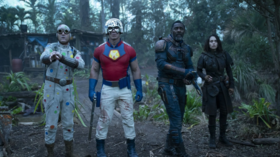The Suicide Squad is a grotesque, grisly, jingoistic state-sponsored horror show propagandising US foreign policy in Latin America

James Gunn’s The Suicide Squad is the latest superhero military propaganda vehicle, courtesy of the Pentagon’s Hollywood office. The result is a cynical, bloody glamorisation of US black ops in Central and South America.
The Suicide Squad is struggling at the pandemic-affected box office but has met with acclaim from critics and praise from audiences who have been largely starved of tentpole movies over the last couple of years. Despite its R-rating, ultra-violent visuals and the preponderance of depressing monologues where the various squad members outline their miserable backstories, it looks on course to be one of the best received movies of 2021.
What is missing from the endless commentary about The Suicide Squad is that the movie was supported by the US military, having won their approval with a storyline about a mostly American team of ruffians and criminal reprobates invading a small island. While a handful of reviewers have noted details such as “military vehicles and dozens of uniformed extras”, the Pentagon’s involvement in this blockbuster has gone completely unreported by the mainstream media.
Also on rt.com Pentagon documents reveal how the DOD bullies movie and TV producers into forcing them to accept their ‘assistance’This is not the first entry in the DC Extended Universe to get past the Pentagon’s vetting process and be rewarded with military assistance. When Warner Bros. launched the DCEU to try to rival the MCU, they not only copied the format of a shared cinematic universe but – just like Marvel – joined forces with the Department of Defense (DOD) to help add production value and get their new franchise off to a strong start.
Documents from the DOD and the Army’s entertainment liaison office detail an enormous scale of support on Man of Steel, after months of script rewrites. These rewrites included removing a scene where a group of Air Force officers aggressively interrogate Lois Lane and including F-35 fighter jets in the final showdown with General Zod’s forces, among many other changes.
Similarly, David Ayer’s 2016 Suicide Squad featured several US Navy characters including a team of SEALs, and credited the US Navy at the end of the film. Ayer himself is a Navy veteran, and had previously worked with the DOD on Fury and U-571.
After Ayer’s Suicide Squad was heavily re-edited by the studio and met with a polarizing response, Warner Bros. pressed on with plans for a sequel. They initially turned to screenwriter Adam Cozad in early 2017, and that summer Cozad went on a special tour of US Space Command arranged by the Air Force.
Files from the Air Force show how dozens of Hollywood bigwigs were invited on the three-day tour. This included Anna Boden and Ryan Fleck, the co-directors of Captain Marvel, writers and producers at Warner Bros. and Netflix, as well as a senior manager at Activision Blizzard Studios who is overseeing the Call of Duty films.
The purpose of the “Entertainment Industry Leader Tour”, according to the documents, was to help the Air Force Hollywood office’s overall mission,“To project and protect the image of the United States Air Force within the global entertainment environment.” A tour agenda describes the Space Command trip as a “Three day, two night trip to Colorado Springs, Colorado to showcase the vital role Space Command plays in our nation's defense.” It goes on, “Attendees will visit Cheyenne Mountain, Schriever AFB, Peterson AFB, Fort Carson, and the beautiful Air Force Academy campus.” It concludes, “The trip aims to inspire realistic storytelling of Air Force people, missions, and assets in the entertainment industry.”
Also on rt.com ‘No Area 51,’ and ‘you can’t blow up the Pentagon’: DOD attempted CENSORING ‘Independence Day’ movie script, archive files revealDelays and problems finding a director to shoot Cozad’s script resulted in Warner Bros. deciding to drop the sequel idea and simply reboot this section of their increasingly disconnected franchise. Cozad was shown the door, and James Gunn was brought on board in late 2018 to both write and direct a new film, while keeping a handful of the cast from Ayer’s version.
Gunn got to work, and by the following March he had produced several drafts of the screenplay for The Suicide Squad. Pentagon documents show that in mid-March the DOD’s entertainment liaison office “Began a conversation with Warner Brothers Studios exploring possible DOD support of an upcoming feature film, a sequel to the 2016 film ‘Suicide Squad’.”
Warner Bros. sent the DOD the script, and an update later that month details how “Producers request the use of CV-22 aircraft. General script notes have been provided to the producers. Air Force is evaluating.” Evidently the Air Force’s evaluation was a positive one because a CV-22 first appears only three minutes into the movie. The aircraft, which functions as both a helicopter and a plane and hence is nicknamed the ‘transformer’, flies the first team of the squad to their mission.
This is where things get disturbing, because the mission is an assault on the fictional South American island of Corto Maltese. The first team are ambushed by the Corto Maltese army and most of them are killed or captured, in a sequence highly reminiscent of the CIA’s failed invasion at the Bay of Pigs in Cuba.
The second team is briefed that a longstanding US-friendly dictatorship had ruled Corto Maltese for nearly a century, but an anti-American government had come to power in a coup, and so the mission is vital to ‘protecting this country’. It would be difficult to find a more obvious parallel for how the US-backed Batista dictatorship was overthrown during the Cuban Revolution, leading to US hostility towards Castro.
The sequences in Corto Maltese were shot in Panama, an ironic and even offensive choice given that the US invaded the country in 1989 to depose Manuel Noriega after he turned against his American backers. But then, it quickly becomes clear that The Suicide Squad is a celebration of US interventions in Central and South America, branding them as pro-democracy and vital to national security.
Nothing could be further from the truth. The US invaded Puerto Rico and Cuba in 1898 for largely economic reasons, and later deposed democratically elected leaders including Jacobo Arbenz in Guatemala and Salvador Allende in Chile and replaced them with militaristic dictators. The failed invasion of Cuba at the Bay of Pigs in 1962 has been echoed in recent operations in Venezuela, where proxies and mercenaries working to destabilise the country have been captured, and left there to rot by their handlers.
This aspect of US interventionism is reflected in The Suicide Squad, where the mysterious Task Force X coerces an assortment of disposable assets to take on the high-risk mission in Corto Maltese. Almost all of the members of the squad are killed off by the time the credits roll, mostly in gruesome yet childish ways.
The message, which is evidently endorsed by the DOD, is that it’s OK to blackmail violent criminals and send them off to Latin America to attack governments who resist US regional hegemony, and if they get caught or killed, well, that’s just the cost of doing business.
Adding insult to injury, at one point the squad tear into a camp full of armed guerillas, slaughtering them all, only to find out they are freedom fighters working against the Corto Maltese government. While the leader of the guerillas is initially angry at the ‘typical Americans’, she immediately joins forces with them, culminating in her murdering the new leaders of the country before being shown on TV announcing free and fair elections.
Democracy in action, indeed.
Also on rt.com Monsters & the military: How ‘Godzilla vs Kong’ follows a long tradition of US meddling in the moviesWhile Margot Robbie as the adorable lunatic Harley Quinn does her best to rescue this psychotic schlock, in the final analysis James Gunn’s The Suicide Squad is a grotesque, grisly, jingoistic state-sponsored horror show.
Curiously, several government agencies are credited at the end of The Suicide Squad, but not the Air Force or DOD. The film commissions of Panama and New Zealand, along with subsidy schemes run by the Canadian and German governments, are all thanked at the end of the movie, but there is no mention of US military support.
Think your friends would be interested? Share this story!
The statements, views and opinions expressed in this column are solely those of the author and do not necessarily represent those of RT.














